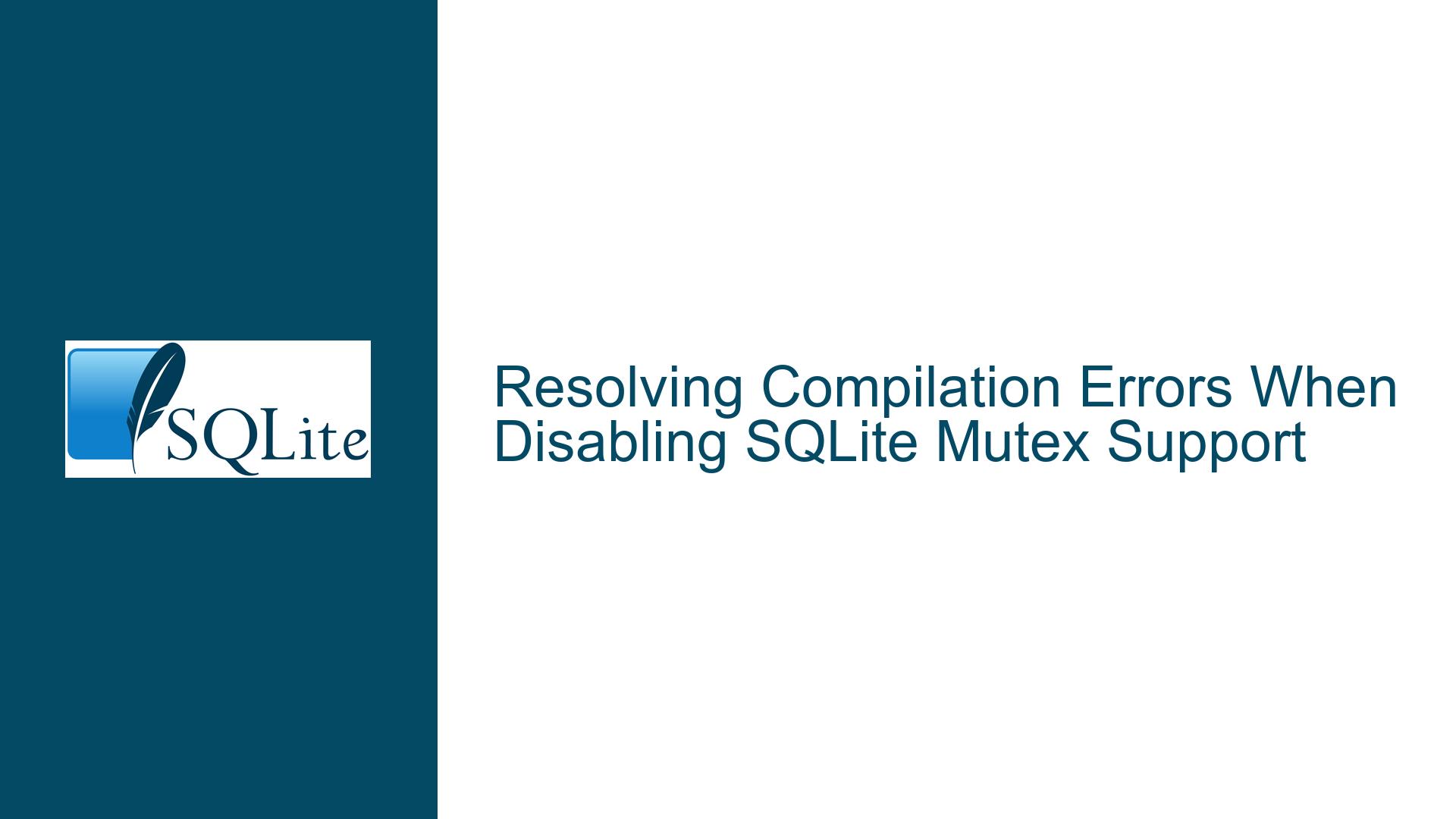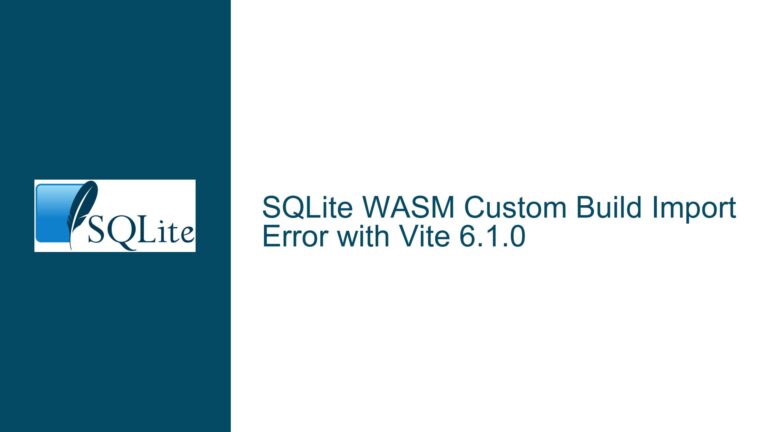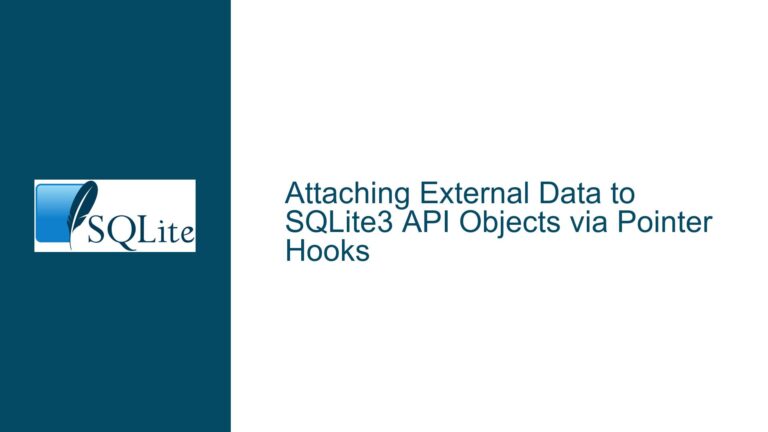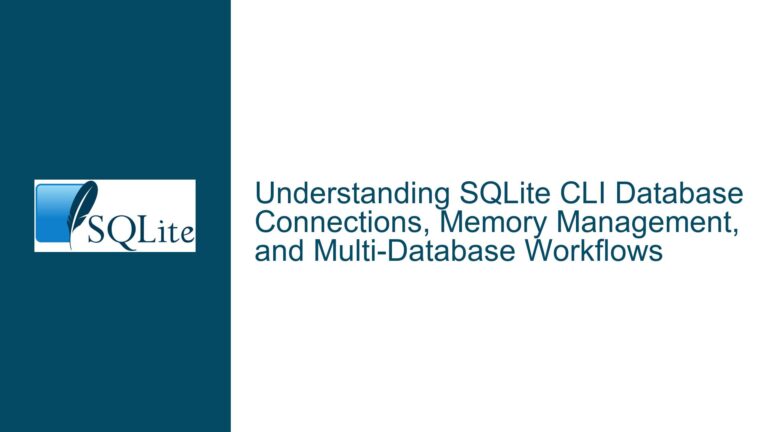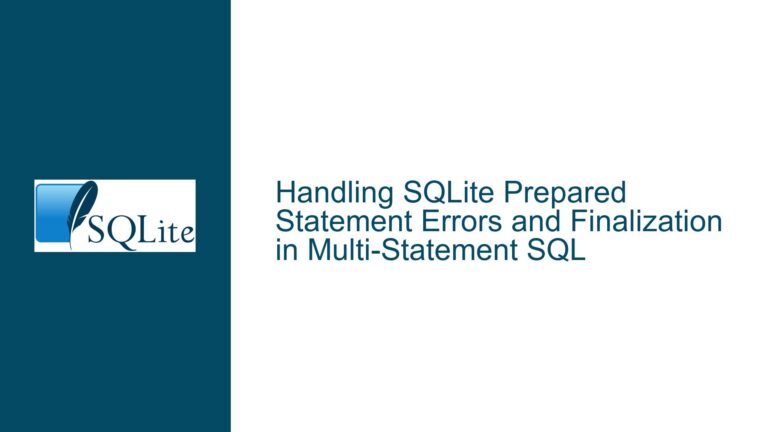Resolving Compilation Errors When Disabling SQLite Mutex Support
Understanding the Conflict Between SQLITE_MUTEX_OMIT and sqlite3MemoryBarrier
Issue Overview
The problem arises when attempting to compile SQLite with the SQLITE_MUTEX_OMIT preprocessor directive, which is intended to exclude mutex (mutual exclusion) logic from the SQLite build. Mutexes are synchronization primitives used to ensure thread safety in multi-threaded environments. Disabling them can theoretically reduce binary size and improve performance in single-threaded applications. However, enabling SQLITE_MUTEX_OMIT triggers a syntax error related to the sqlite3MemoryBarrier macro at line 28475 of the SQLite source code. This macro is part of SQLite’s memory management subsystem and is critical for enforcing memory consistency guarantees, even in single-threaded builds.
A secondary observation is that using SQLITE_MUTEX_NOOP instead of SQLITE_MUTEX_OMIT allows the code to compile without errors. However, this alternative does not yield meaningful performance or size improvements. The SQLITE_MUTEX_NOOP directive replaces mutex operations with empty stubs, but it does not eliminate the underlying infrastructure that supports mutexes. This results in residual code that still references mutex-related components, including memory barriers.
The core conflict lies in SQLite’s dependency graph: certain subsystems, such as memory management and atomic operations, implicitly rely on mutex-related constructs even when mutexes are ostensibly disabled. The sqlite3MemoryBarrier macro is one such dependency. When SQLITE_MUTEX_OMIT is defined, the build process skips the implementation of mutexes but does not automatically adjust downstream dependencies that assume mutexes are present. This creates an inconsistency where the compiler encounters references to undefined components, leading to syntax errors.
Root Causes of the sqlite3MemoryBarrier Error and Ineffective Mutex Disabling
Possible Causes
Deprecated or Unmaintained Code Paths: The
SQLITE_MUTEX_OMITdirective is a legacy configuration option that has not been rigorously maintained in recent SQLite versions. SQLite’s build system and source code are continuously optimized for widely used configurations, such asSQLITE_THREADSAFE=0, while less common options likeSQLITE_MUTEX_OMITmay lack proper validation. This results in unresolved dependencies when the directive is activated.Implicit Reliance on Mutex-Related Macros: The
sqlite3MemoryBarriermacro is part of SQLite’s atomic memory access utilities. In multi-threaded builds, memory barriers are often implemented using mutexes or platform-specific atomic operations. When mutexes are omitted viaSQLITE_MUTEX_OMIT, the build system fails to provide an alternative implementation forsqlite3MemoryBarrier, causing the compiler to flag its absence.Incomplete Mutex Elimination with SQLITE_MUTEX_NOOP: The
SQLITE_MUTEX_NOOPdirective replaces mutex operations with no-op (non-operational) stubs. While this avoids compilation errors, it does not remove the infrastructure for mutex initialization, storage, or associated sanity checks. Consequently, the compiled binary retains dead code and unused data structures, negating potential size or performance gains.Thread Safety as a Higher-Level Abstraction: SQLite’s thread safety is governed by the
SQLITE_THREADSAFEcompile-time flag. When set to0, this flag disables all threading support, including mutexes, and triggers a more comprehensive optimization of the codebase. Directives likeSQLITE_MUTEX_OMITandSQLITE_MUTEX_NOOPoperate at a lower level and do not coordinate with higher-layer abstractions, leading to inconsistencies.
Resolving Compilation Errors and Optimizing SQLite for Single-Threaded Use
Troubleshooting Steps, Solutions & Fixes
Step 1: Replace SQLITE_MUTEX_OMIT with SQLITE_THREADSAFE=0
The definitive solution is to compile SQLite with -DSQLITE_THREADSAFE=0 instead of using mutex-related directives. This flag disables thread safety at the highest level, ensuring that all mutex logic, memory barriers, and threading subsystems are excluded from the build. Unlike SQLITE_MUTEX_OMIT, this option is rigorously tested and widely deployed in production environments.
To implement this:
- Modify your compiler flags to include
-DSQLITE_THREADSAFE=0. - Remove any references to
SQLITE_MUTEX_OMITorSQLITE_MUTEX_NOOPfrom your build configuration. - Rebuild SQLite from clean sources to ensure no residual object files interfere with the new configuration.
Step 2: Address the sqlite3MemoryBarrier Dependency
If you must use SQLITE_MUTEX_OMIT (e.g., for legacy compatibility), you must provide a custom implementation of sqlite3MemoryBarrier. The macro is defined in sqlite3.c and typically relies on platform-specific atomic operations or mutexes.
For single-threaded builds, a memory barrier may be unnecessary, as there are no concurrent threads to reorder memory accesses. In such cases, define the macro as an empty operation:
#define sqlite3MemoryBarrier()
Add this definition to your build configuration or modify the SQLite source code directly before compiling.
Step 3: Validate Binary Size and Performance Improvements
After compiling with SQLITE_THREADSAFE=0, verify the results:
- Use tools like
size(Unix) or a binary analysis toolchain to compare the size of the compiled SQLite library before and after the change. - Run performance benchmarks in a single-threaded environment to measure improvements in execution speed.
Note that SQLITE_THREADSAFE=0 renders the SQLite library unsafe for use in multi-threaded contexts. All database connections and associated objects must be confined to a single thread.
Step 4: Alternative Approaches for Partial Mutex Elimination
If SQLITE_THREADSAFE=0 is too restrictive (e.g., your application requires limited threading but wants to minimize mutex overhead), consider these alternatives:
- Use
SQLITE_THREADSAFE=2(thread-safe for multiple connections but not necessarily thread-safe for sharing connections across threads). - Combine
SQLITE_MUTEX_NOOPwithSQLITE_OMIT_SHARED_CACHEto disable shared cache mode, reducing mutex contention.
However, these approaches are niche and require careful testing to ensure thread safety.
Step 5: Patching the SQLite Source Code (Advanced)
For deeply embedded systems or highly customized builds, you may need to patch the SQLite source code to resolve dependencies between mutexes and memory barriers. Key areas to modify include:
- Loosen Conditional Compilation Guards: In
sqlite3.c, locate#ifdef SQLITE_MUTEX_OMITblocks and ensure they also disable or redefine any dependencies onsqlite3MemoryBarrier. - Refactor Memory Management: The page cache and memory allocator subsystems often interact with mutexes. Replace mutex-guarded sections with single-threaded equivalents.
This step requires expertise in SQLite internals and is not recommended for general use cases.
Step 6: Verify Platform-Specific Atomic Operations
Some platforms (e.g., x86, ARM) provide intrinsic atomic operations that SQLite uses for memory barriers. If SQLITE_MUTEX_OMIT is used on such platforms, ensure that the sqlite3MemoryBarrier macro leverages these intrinsics instead of relying on mutexes. For example:
#if defined(__GNUC__) && (defined(__i386__) || defined(__x86_64__))
#define sqlite3MemoryBarrier() __asm__ __volatile__("" ::: "memory")
#endif
Consult your platform’s documentation for appropriate low-level synchronization primitives.
Step 7: Consult SQLite’s Official Documentation and Mailing Lists
SQLite’s documentation (https://sqlite.org/compile.html) provides authoritative guidance on compile-time options. The SQLITE_THREADSAFE flag is explicitly recommended for disabling threading support, whereas SQLITE_MUTEX_OMIT is not mentioned in recent documentation, underscoring its deprecated status.
Final Note: The SQLite development team prioritizes configurations that align with real-world use cases. SQLITE_THREADSAFE=0 is battle-tested and aligns with the library’s design philosophy of flexibility through compile-time customization. Legacy options like SQLITE_MUTEX_OMIT are vestigial and should be avoided in favor of higher-level, supported configurations.
